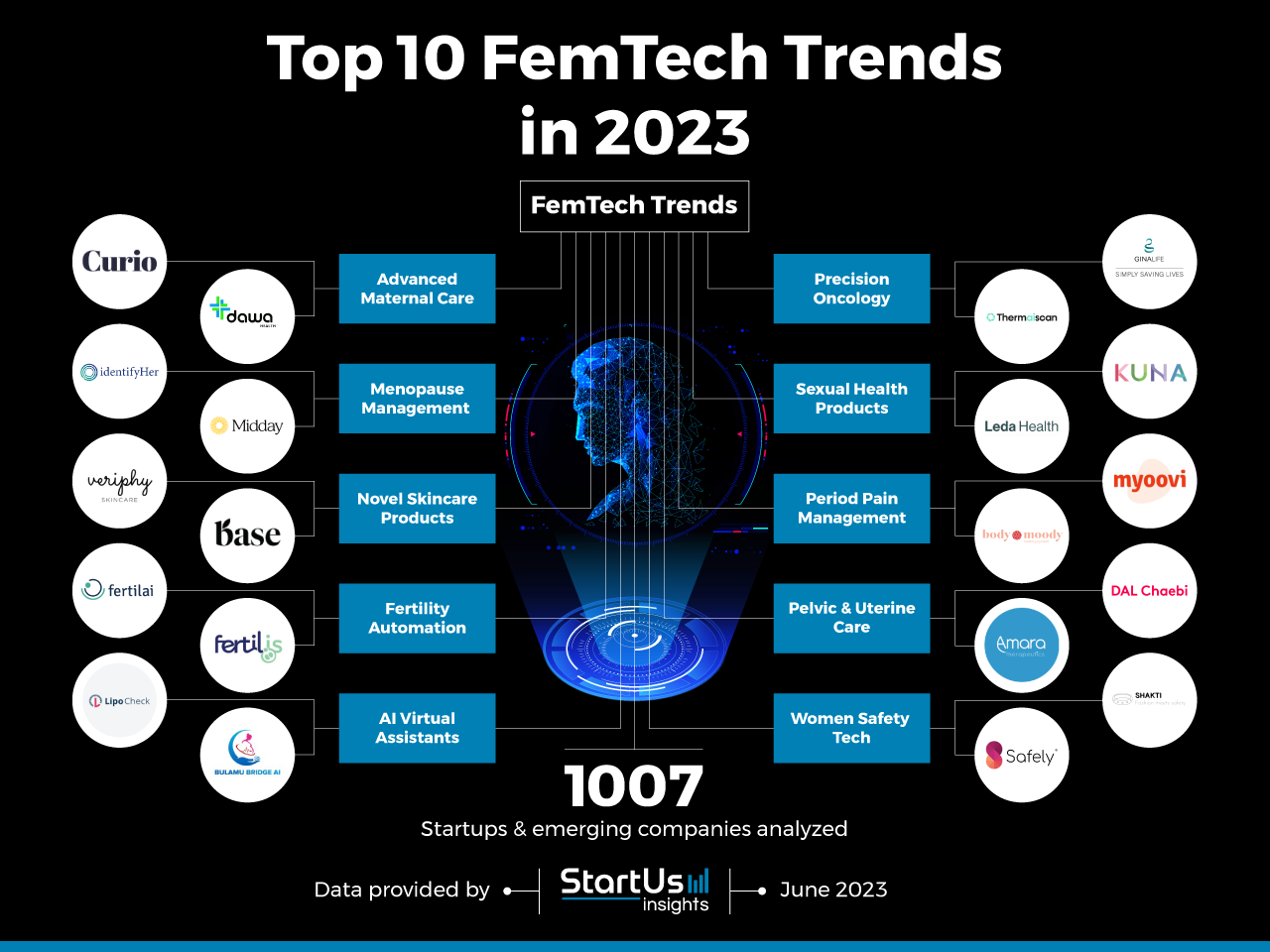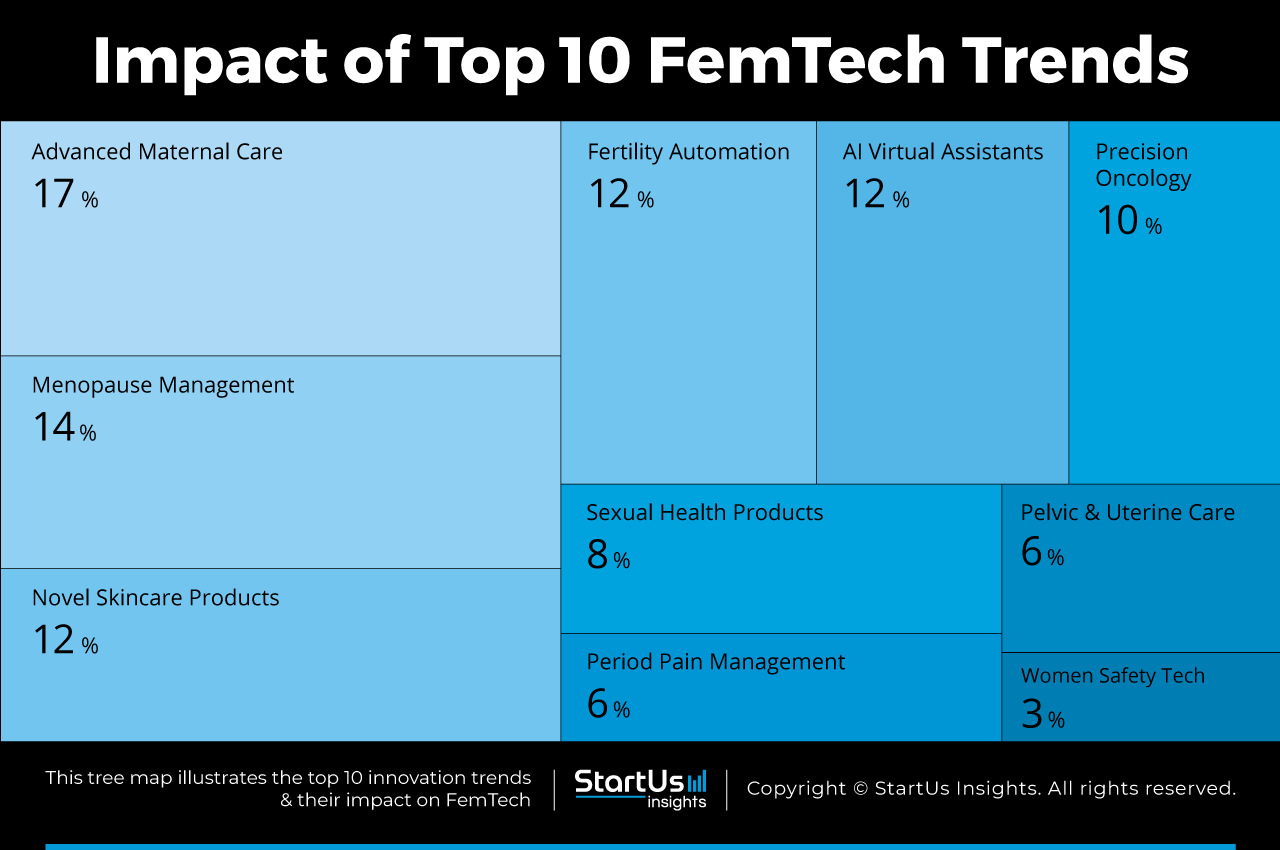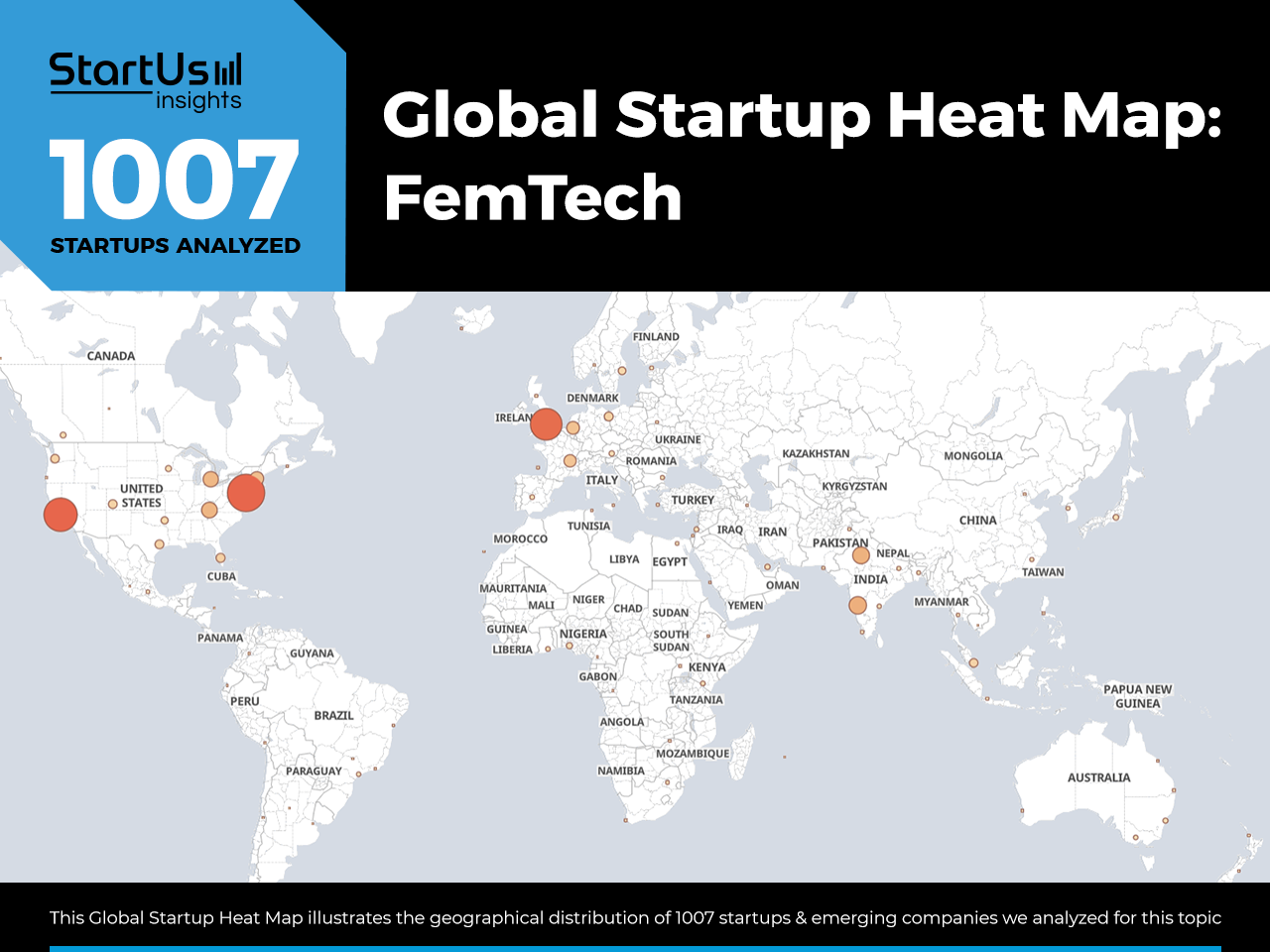Female technology, or FemTech solutions, improve women’s health, safety, and empowerment through the use of AI, wearables, and gynecological cancer detection tools. This industry research highlights the top 10 FemTech trends in 2025, based on an analysis of over 1000 emerging companies. These trends support maternal health, menopause management, uterine health, women’s safety, and more, using technologies like personalized health apps, hormone-tracking wearables, and AI-powered fertility monitors. Read on to explore these innovations in FemTech and discover how they can benefit you.
This article was last updated in August 2024.
Innovation Map outlines the Top 10 Trends in FemTech & 20 Promising Startups
For this in-depth research on the Top Female Technology Trends & Startups, we analyzed a sample of 1000+ global startups & scaleups. This data-driven research provides innovation intelligence that helps you improve strategic decision-making by giving you an overview of emerging technologies in the health and wellness industry. In the FemTech Innovation Map below, you get a comprehensive overview of the innovation trends & startups that impact your company.
These insights are derived by working with our Big Data & Artificial Intelligence-powered StartUs Insights Discovery Platform, covering 4.7M+ startups & scaleups globally. As the world’s largest resource for data on emerging companies, the SaaS platform enables you to identify relevant technologies and industry trends quickly & exhaustively.

Want to explore all FemTech innovations & trends?
Tree Map reveals the Impact of the Top 10 FemTech Trends in 2025
Based on the Female Technology Innovation Map, the Tree Map below illustrates the impact of the Top FemTech Industry Trends in 2025. Startups are developing solutions to facilitate maternal care as well as tackle prenatal and postpartum issues. While wearables and healthcare interventions simplify menopause symptom management, innovative skincare products remain a top trend in this industry. Further, fertility automation solutions, including pregnancy monitoring, menstruation tracking, and infertility procedures, are gaining interest.
AI virtual assistants and sexual health products help reduce the stigma associated with women’s health and encourages more women to seek help. Similarly, precision oncology tools for early detection of women’s cancers improve health outcomes. Startups are developing solutions directly targeting period pain management and pelvic & uterine care to cater to a large women population. Lastly, novel tech solutions advance women’s safety and ensure a safer environment for women in society through real-time monitoring and threat response.
Top 10 Female Technology Trends in 2025
- Advanced Maternal Care
- Menopause Management
- Novel Skincare Products
- Fertility Automation
- AI Virtual Assistants
- Precision Oncology
- Sexual Health Products
- Period Pain Management
- Pelvic & Uterine Care
- Women Safety Tech
Global Startup Heat Map covers 1000+ FemTech Startups & Scaleups
The Global Startup Heat Map below highlights the global distribution of the 1007 exemplary startups & scaleups that we analyzed for this research. Created through the StartUs Insights Discovery Platform, the Heat Map reveals high startup activity in the US and the UK, followed by India. Below, you get to meet 20 out of these 1007 promising startups & scaleups as well as the solutions they develop. These female technology startups are hand-picked based on criteria such as founding year, location, funding raised & more. Depending on your specific needs, your top picks might look entirely different.
Top 10 Trends in FemTech (2025)
1. Advanced Maternal Care
Digital health platforms for maternal care deliver personalized and accessible services to expectant mothers throughout pregnancy, childbirth, and postpartum. They feature remote prenatal consultations, real-time monitoring of vital signs, and early detection of potential pregnancy complications. Innovations in wearable devices and mobile applications further empower women to track their own health parameters. They also provide women with personalized recommendations and access to educational resources.
Novel maternal care systems provide proactive risk assessment and personalized care plans by integrating data analytics and AI. Additionally, startups build portable medical devices to enable healthcare access at remote locations and reduce complications of high-risk pregnancies. Examples of such devices include continuous fetal monitors and portable ultrasound machines. These innovations improve maternal, neonatal, and pediatric health as well as promote proactive and patient-centered care.
Curio provides Evidence-based Digital Therapeutics
US-based startup Curio offers a suite of clinically-validated digital health therapeutic programs for women. Its MamaLift suite of programs leverages neurobehavioral intervention to reduce the risk of depression and anxiety during pregnancy or post-delivery. They feature intelligent personalized guidance and community-based care as well as provide access to clinically-trained digital health coaches. Its algorithms are evidenced by cognitive and dialectical behavioral therapy (CBT & DBT), interpersonal therapy (IPT), and behavioral activation therapy (BAT). Clinical psychologists partner with Curio to develop women’s patient-centric programs for their behavioral and physical healthcare needs.
Dawa Health facilitates Home-based Maternal Care
Zambian startup Dawa Health develops DawaMom, an AI-powered platform for last-mile health services at home and community levels. The startup onboards clinical officers, midwives, nurses, and community health workers (CHWs) and equips them with a point-of-care (POC) kit to triage patients in the comfort of their homes. The platform also provides patients with a summary of each visit, patient records, and clinician notes, and supports online appointment management. It also develops Rudo, an NLP-powered chatbot designed to improve the patient experience. Clinicians use the app to address the health challenges in maternal, neonatal, and pediatric health.
2. Menopause Management
Menopause management solutions leverage digital health platforms, wearable devices, and mobile applications. They offer tailored interventions, symptom tracking, and educational content. This empowers women to monitor and manage symptoms such as hot flashes, mood changes, sleep disturbances, and hormonal fluctuations swiftly. Advances in menopause management include laser therapy, hormone therapy alternatives, and integrative approaches that combine lifestyle modifications, nutrition, and mindfulness techniques. These solutions enhance women’s understanding of menopause, foster self-care practices, and facilitate informed decision-making. Startups build clinical-grade devices and smartphone apps to track and analyze symptoms and offer tailored recommendations for symptom management.
IdentifyHer enables Menopausal Symptom Tracking
IdentifyHer is an Irish startup that provides AI-driven sensor solutions for women going through menopause. The startup’s sensor passively collects menopause symptom data when activated through its smartphone app. This sensor gathers information without disrupting the normal lives of the wearer. The app also utilizes the collected data to track progress, evaluate the effectiveness of lifestyle changes, and aid clinicians in diagnosing and managing menopausal symptoms. Moreover, it provides daily, weekly, and monthly reports on the data collected.
Lisa Health offers Comprehensive Menopause Management
Lisa Health, a US-based startup, develops Midday, a personalized menopause app that provides end-to-end management of the menopause journey. Midday uses advanced tracking to identify the stage of menopause and expect symptoms. It also features a hormone therapy decision support tool, AI-based symptom tracking, and a wearable device. This offers a range of therapeutic options and educational resources to provide personalized insights and prepare users for each menopause stage. Physicians use this app for end-to-end menopause management and decision support.
3. Novel Skincare Products
Advanced skincare and beauty products utilize novel formulations and technologies to address the diverse concerns specific to women. These products leverage cutting-edge ingredients, research-backed formulations, and tailored approaches to address issues like hormonal changes, acne, aging, and specific skin conditions. The advances in skincare include natural and sustainable ingredients, microencapsulation, and nanotechnology-based delivery systems for optimal drug efficacy.
These products also emphasize skin health and overall well-being by considering factors like lifestyle, environment, and individual needs. Moreover, they often integrate digital platforms and apps to provide personalized skincare recommendations, virtual consultations, and progress tracking. Furthermore, teledermatology platforms reduce wait times and enable timely interventions for conditions ranging from acne and eczema to skin cancer.
Veriphy Skincare delivers Glycogen-based Skincare
Canadian startup Veriphy Skincare develops phytoglycogen-based skincare products. Its key ingredient, PhytoSpherix, is a plant-derived glycogen that boosts the skin’s natural ability to produce collagen and hyaluronic acid. This results in an improvement in the appearance of skin firmness, smoothness, and hydration. The startup’s products are free from sulfates, parabens, mineral oil, phthalates, fragrances, silicones, and other potentially harmful ingredients. This way, the startup produces natural, clean, science-backed skincare solutions that improve skin texture and reduce hyperpigmentation.
PT Basis Inovasi develops Vegan Skincare Products
Indonesian startup PT Basis Inovasi offers a Base skincare brand that develops vegan products for skin care. Base’s range of products utilizes only plant-based ingredients and is customized according to the user’s skin requirements. Moreover, each product is free from SLS, phthalates, parabens, dyes, perfumes, or GMOs. Its products’ functions range from skin hydration, replenishment, toning, acne care, and general maintenance. The startup skincare brand is environmentally friendly and advances personalized skincare.
4. Fertility Automation
Fertility automation enhances reproductive health and assists individuals and couples in their fertility journey by optimizing fertility tracking and prediction. It offers precise ovulation forecasting, fertility monitoring, and menstrual cycle tracking through connected fertility devices. These innovations enable women to gain reproductive health insights, identify fertile windows, improve the chances of conception, and facilitate family planning.
Assisted reproductive technologies (ART) like in vitro fertilization (IVF) and intracytoplasmic sperm injection (ICSI) also improve fertility. Startups automate these procedures to increase the success rates of fertility treatments. They also automate laboratory procedures for fertility preservation including egg, sperm, and embryo freezing. Lastly, startups develop contraceptive apps, connected devices, and hormone-free contraceptive alternatives that support women’s individual needs and preferences.
FertilAI provides Decision Support for Fertility Clinics
Israeli startup FertilAI leverages AI to enhance fertility treatments and provide clinical decision support. Fertilane is the startup’s AI platform to optimize clinical outcomes and improve patient access to fertility treatments. The platform supports clinicians in providing data-driven insights from ovulation tracking to more advanced treatments like IVF. It improves clinical outcomes, reduces unnecessary testing, and enables optimizes treatment timing. Additionally, it offers a patient application that streamlines patient communication and enhances treatment efficiency. FertilAI’s solution supports clinicians in treatment planning and improving patient outcomes.
Fertilis enables IVF Automation
Australian startup Fertilis automates in vitro fertilization technology by developing its patented micro-3D printed cradle. The startup’s technology provides optically clear cradles that automatically monitor the nutritive composition of the formulated solutions bathing the embryo. This optimizes the embryo’s growth environment and brings precision to the IVF process. Further, the cradle features compatibility with imaging systems and offers easy loading and unloading capabilities, making it workable with any petri-dish. This way, the startup automates the IVF technology and brings further precision to embryologists.
5. AI Virtual Assistants
AI-powered chatbots and virtual assistants personalize support for women seeking reproductive health information and guidance. Startups build chatbots powered by natural language processing (NLP) and machine learning (ML) algorithms to offer accurate and reliable information. These bots cover topics such as menstrual health, contraception, fertility, and sexual wellness and provide support on stigmatized or sensitive topics. Moreover, these virtual assistants enable discreet and judgment-free conversations, fostering open dialogue. This empowers women and young girls to make informed health decisions. Additionally, AI virtual assistants integrate with other femtech devices and platforms, facilitating seamless data sharing for overall health management.
LipoCheck offers a Lipoedema Care Assistant
German startup LipoCheck develops an eponymous intelligent assistant to aid in the treatment of lipoedema. The platform performs initial patient examinations and offers treatment and process quality improvement suggestions. It also provides digital documentation of disease progression and a comprehensive overview of the patient’s condition. LipoCheck readily interfaces with existing practice management systems (PMS) and offers a holistic disease picture for each patient profile. Lipo clinics and physiotherapy practices use the startup’s solution to enhance daily practice, provide better overviews, and facilitate patient communication.
Lasa Health offers a Personal Health Assistant
US-based startup Lasa Health develops Lasa AI, a personal health assistant for women with chronic pelvic pain. It answers questions and suggests coping strategies like therapeutic exercises and relaxation techniques to assist in pain management. Additionally, the startup’s AI-powered screening platform identifies undiagnosed chronic pelvic pain patients. It also integrates with electronic health records (EHRs) to provide care from initial screening to post-appointment support. With personalized patient care, Lasa Health enables women to better manage endometriosis, painful periods, pelvic pain, and flare-ups.
6. Precision Oncology
Precision oncology innovations encompass integrated cancer diagnostics and therapeutic advancements. They enhance women-specific cancer care by tailoring treatment strategies to an individual’s unique genetic profile, tumor characteristics, and lifestyle factors. Startups build genomic sequencing and bioinformatics analytical tools to identify specific mutations and biomarkers. These data points enable oncologists to select suitable targeted therapies and ensure higher efficacy and lower side effects to improve the quality of life for women.
Further, innovative screening methods like liquid-based cytology and HPV testing enhance the accuracy of cervical cancer detection and reduce mortality rates. Similarly, early breast and skin cancer screening through digital mammography and AI-based mammogram analysis accelerate cancer detection. Startups also develop mobile applications and devices that facilitate self-examination to monitor changes in breasts or skin lesions, promoting timely intervention.
Nevia facilitates Early Ovarian Cancer Detection
Israeli startup Nevia leverages its machine-learning platform for early detection of ovarian cancer. The startup uses a vaginal swab to collect biomarkers in secretion. The platform then analyzes the biomarkers to identify potential health risks. It uses this information to provide an analysis and prognosis of ovarian cancer and endometriosis. The startup’s solution addresses the issue of late diagnosis which leads to poor quality of life and low survival rates.
Thermaiscan Technology simplifies Breast Cancer Pre-screening
Swedish startup Thermaiscan Technology builds thermal imaging technology and AI algorithms to detect breast cancer at an early stage. The startup’s software-as-a-service (SaaS) solution is a smartphone-based pre-screening tool that detects abnormalities in breast tissue using a thermal camera sensor. The thermography shows temperature differences on pixel level thus enabling early detection of any abnormalities in the breast tissue. Its AI algorithm quickly analyzes the captured image for breast cancer risk assessments. Thermaiscan’s solution provides a non-invasive breast cancer pre-screening tool for healthcare professionals in primary care, mini-clinics, and remote doctors.
7. Sexual Health Products
Startups develop products to enhance sexual well-being and address various concerns related to sexual function and experience. Products such as vibrators, lubricants, pelvic floor trainers, and educational resources empower individuals in exploring and enhancing their sexual health. These products incorporate technologies such as app-connected devices to track and analyze sexual activity, provide personalized recommendations, and promote sexual education.
These foster open conversations about sexual health, reduce stigma, promote self-care and self-exploration as well as eliminate societal taboos surrounding sexual topics. Further, startups offer digital platforms to deliver educational guides on sexual hygiene, consent, contraception, sexually transmitted infections and diseases (STIs & STDs), and relationship dynamics. Others also provide DNA test kits to survivors of sexual and domestic violence and home-based test kits for STIs and STDs. These innovations bridge knowledge gaps, promote informed decision-making, and foster healthier attitudes toward sexual health.
Kuna develops a Sex Education App
Mexican startup Kuna provides a chatbot to provide a safe tool for women to get information and guidance on sexual health and parenthood. Kuna Chat, the startup’s AI-powered chat assistant provides information on sexual health, reproduction, maternity, and parenthood. It uses a large language model (LLM) to understand, constantly improve, and respond to user concerns in natural human language. Additionally, the startup offers online consultations with experts for more detailed or difficult inquiries. This way, Kuna provides reliable, actionable, and concrete answers to users’ questions and promotes sex education for the under-informed.
Leda Health makes an STI Test Kit
US-based startup Leda Health provides STI testing and emergency contraception services as well as early evidence kits (EEK) for survivors of sexual assault. The startup offers around-the-clock discreet delivery of time-sensitive services with a connected mobile application for guidance. Moreover, it delivers early evidence kits for the collection of time-sensitive DNA after a sexual assault. Additionally, the startup’s mobile app provides customized guidance, video support, and live chat with EEK’s next steps and overall well-being. This way, the startup provides trauma care and healing services to communities and empowers sexual violence survivors.
8. Period Pain Management
Startups develop wearable devices, heat therapy products, and smart apps to track and manage the discomfort and disruption caused by menstrual pain. These solutions offer effective methods to alleviate symptoms and improve menstrual well-being. Moreover, they provide data-driven insights, reminders for pain relief methods, and lifestyle recommendations to ease symptoms. Period pain management also leverages advances in non-pharmacological approaches such as mindfulness applications and fosters community support through online platforms.
Similarly, many startups provide evidence-based recommendations for menstrual cycle understanding, hormonal changes, menstrual health, and hygiene. These enable women to gain insights into their menstrual cycles, cycle irregularities, and associated symptoms for better management and cure. Startups also develop pain-relieving medications using natural ingredients to reduce side effects or non-invasive techniques like transcutaneous electrical nerve stimulation (TENS). They contribute to destigmatizing menstruation, empowering women to make informed decisions about their health, and seeking appropriate support when needed.
Myoovi facilitates Period Cramp Management
UK-based startup Myoovi offers a drug-free solution for period pain relief. Its menstrual cramp management product, Myoovi Kit, uses the TENS technology to block pain nerve signals from reaching the brain. This provides the wearer instant pain relief from period pain and endometriosis. The TENS pad uses a butterfly design to offer maximum skin contact and is discreet and portable, making it convenient for daily usage. Thus, Myoovi provides a natural remedy to menstrual pain, allowing women to continue their daily activities without discomfort.
Body Moody makes a Heated Bodysuit
Czech startup Body Moody develops a bodysuit that uses heat to alleviate menstrual pain and back pain. The startup’s bodysuit is equipped with a warmth-conductive layer that provides gentle warmth to the lower abdomen and lumbar region. The heat intensity is controllable through a mobile app or through the power pack attached to the bodysuit. The startup’s product provides a drug-free alternative for menstrual pain relief, allowing women to maintain their daily activities without discomfort.
9. Pelvic & Uterine Care
Ultrasound imaging and hysteroscopy allow for accurate and non-invasive evaluations of pelvic and uterine health. They also facilitate treatments such as minimally invasive surgeries, targeted drug therapies, and non-surgical interventions for fibroids, endometriosis, and pelvic floor disorders. Startups develop integrated health platforms for remote monitoring, personalized care, and access to healthcare providers specialized in pelvic and uterine health.
Intelligent devices offer real-time feedback, guided exercises, and tracking capabilities, empowering women to effectively engage and strengthen their pelvic floor muscles. By promoting proper pelvic floor function, they address issues such as urinary incontinence, pelvic organ prolapse, and sexual health concerns. Additionally, pelvic and uterine care solutions deliver self-help in addressing the challenges faced by women during pregnancy, childbirth, and postpartum recovery.
Amara Therapeutics delivers Digital Therapeutics (DTx) for Pelvic Care
Irish startup Amara Therapeutics provides a digital therapeutics solution for women suffering from pelvic and bladder health conditions. The startup provides a multi-therapy platform that directly delivers clinically validated intervention to patients’ smartphones. It offers treatment pipelines for overactive bladder, stress urinary incontinence, pelvic organ prolapse, interstitial cystitis, sexual dysfunction, and fecal incontinence. This facilitates affordable and personalized care for patients at the convenience of their homes. Clinical experts use the startup’s platform to provide patient-centric healthcare remotely and effectively.
DAL Company facilitates Self-Directed Health Care
South Korean startup DAL Company designs Dalchaebi, a self-health management app for women. It provides recommendations as per individual goals, such as the management of polycystic ovary syndrome (PCOS), premenstrual syndrome (PMS), or uterine conditions. The app allows women to record menstrual cycles, pelvic health, diet, exercise, medication, and sleep as well as sends reminders according to pre-set schedules. It thus helps patients to adhere to and achieve daily health habits as well as self-manage their health conditions. The app also motivates users through gamified challenges. This way the Dalchaebi app promotes the hormonal, pelvic, and overall health and well-being of women.
10. Women’s Safety
Safety technologies empower women and provide them with tools to protect themselves in various situations. Startups build women-centric tools like wearable devices and connected platforms that enable real-time tracking and emergency alerts. These technologies incorporate features like GPS tracking, distress signals, and audio or video recording capabilities to enhance personal safety. They also integrate with local law enforcement and support services, facilitating prompt assistance during emergencies.
Additionally, women’s safety tech fosters community engagement through online platforms, encouraging information sharing and providing resources for self-defense and safety awareness. Moreover, women face the risk of violence, harassment, cyberbullying, or assault in various settings, hence startups provide discreet communication channels and secure platforms. These tools document incidents, connect with support networks, and provide access to information about legal rights and available resources.
Epowar develops an Automatic Attack Detection App
UK-based startup Epowar builds an AI-powered personal safety app to enhance women’s safety during journeys. The app automatically detects physical attacks by monitoring heart rate and motion through a connected smartwatch. Further, it sends alerts to pre-selected friends upon detecting distress. The app also features an SOS button on the lock screen and journey sharing with friends for live location tracking and alerts. Moreover, the app compiles evidence like microphone recordings, vital signs, and location data stored in the cloud during emergencies.
Safely provides a Peer-to-Peer (P2P) Personal Safety App
Australian startup Safely develops a personal safety app to provide P2P support in situations of unease and fear. The app allows users to create private groups or circles with their contacts for live location sharing and internal chats. It also allows users to activate the high-alert mode and send out warnings to all their assigned guardians in case of emergencies. The app then records live video and audio, uses live monitoring, and delivers GPS updates, which are also saved to the cloud for potential use as evidence. Further, users get safety alerts from locations of interest to plan their travel or commute safely.
Discover all FemTech Trends, Technologies & Startups
The future of the female wellness and safety industry is witnessing remarkable growth driven by advancements in technology. From home diagnostics products to personalized and accessible healthcare, femtech is empowering women to take control of their well-being. Female-centric applications, wearables, and telemedicine further advance femtech innovations. Moreover, increased awareness and support for women’s health issues are driving innovation that reshapes healthcare delivery and promotes gender equity. The FemTech trends & startups outlined in this report only scratch the surface of trends that we identified during our data-driven innovation & startup scouting process. Identifying new opportunities & emerging technologies to implement into your business goes a long way in gaining a competitive advantage.




![AI in Healthcare: A Strategic Guide for Industry Leaders [2025-2030]](https://www.startus-insights.com/wp-content/uploads/2025/03/AI-in-Healthcare-SharedImg-StartUs-Insights-noresize-420x236.webp)






